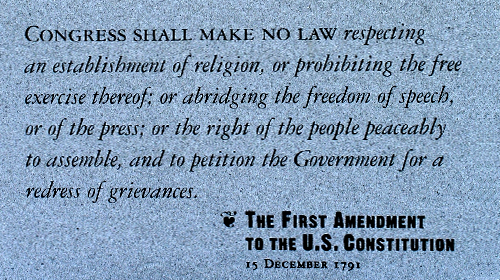
The Senate Judiciary Committee yesterday took up a federal reporter shield law for the second time this year, after getting caught up back in July over the definition of a journalist. This time around, however, the committee passed it, marking the first time a shield bill has moved since 2009, when momentum behind a very similar measure died an unfortunate death after the Wikileaks affair. Despite some flaws, it's on balance a positive step toward greater press freedom and government transparency.
The recent revelations that the Justice Department has aggressively investigated members of the news media in several high-profile leaks inquiries have breathed new life into the measure, which would add federal protections on top of the 49 states that already "shield" reporters from having to disclose their sources and work product.
So, how is the bill from a civil liberties point of view? The truth is, despite several unnecessary provisions that weaken its protections, it can't be anything but positive. The status quo is unacceptable. Championed by Sens. Charles Schumer (D-N.Y.) and Lindsey Graham (R-S.C.), the bill has been harried by both Democrats and Republicans on several fronts. That it lives to fight another vote is a very good thing.
The biggest change between this bill and S. 448, which died in 2009, is who's covered by the legislation. In 2009 (prior to Wikileaks being a thing), the bill had a narrow-ish definition of journalist, skewed to the legacy media, but still possibly inclusive of professional bloggers, citizen reporters, and other new media types.
Following Wikileaks, Sen. Dianne Feinstein (D-Calif.) pushed for a much narrower definition that, most troublingly, would not cover anyone "whose principal function, as demonstrated by the totality of such person or entity's work, is to publish primary source documents that have been disclosed to such person or entity without authorization." In other words (they hope): Wikileaks.
But, the new bill, while adopting the crabbed Feinstein definition, also has a safety valve that may, depending on how it's implemented, end up being quite positive. It would allow a judge discretion to expand the scope of the act to anyone if the judge determines it "would be in the interest of justice and necessary to protect lawful and legitimate news-gathering activities."
Now, if you actually go and look at Wikileaks (wikileaks.org), it's far from just an indiscriminate site for document dumps. The site's authors collate, curate, and comment on the material they source—much like any other news organization. Maybe wishful thinking, but it's not outside the realm of possibility that a federal judge—looking at how Wikileaks and similar outlets actually operate, not how they're portrayed in the press—will avail these new media sources of the law's protections.
Admittedly, it's far from perfect. It also threatens to open the door to a First Amendment advocate's worst nightmare—inconsistent and possibly selective application of an overly vague rule. But, it's a far sight better than the original anti-Wikileaks definition.
We've also expressed serious concern with several carve-outs in the bill. In particular, the national security exception is fundamentally unnecessary and would likely and inappropriately exempt the AP and James Risen subpoenas, as well as the James Rosen case. But, the bill maintains protections for criminal defendants, allowing them to pierce the privilege when necessary to protect due process. Advocates can also continue to push for improvements as it moves through the Senate and, hopefully, the House.
All in all, this is a good first step toward a more informed populace in America.
Learn more about the first amendment and other civil liberty issues: Sign up for breaking news alerts, follow us on Twitter, and like us on Facebook.



